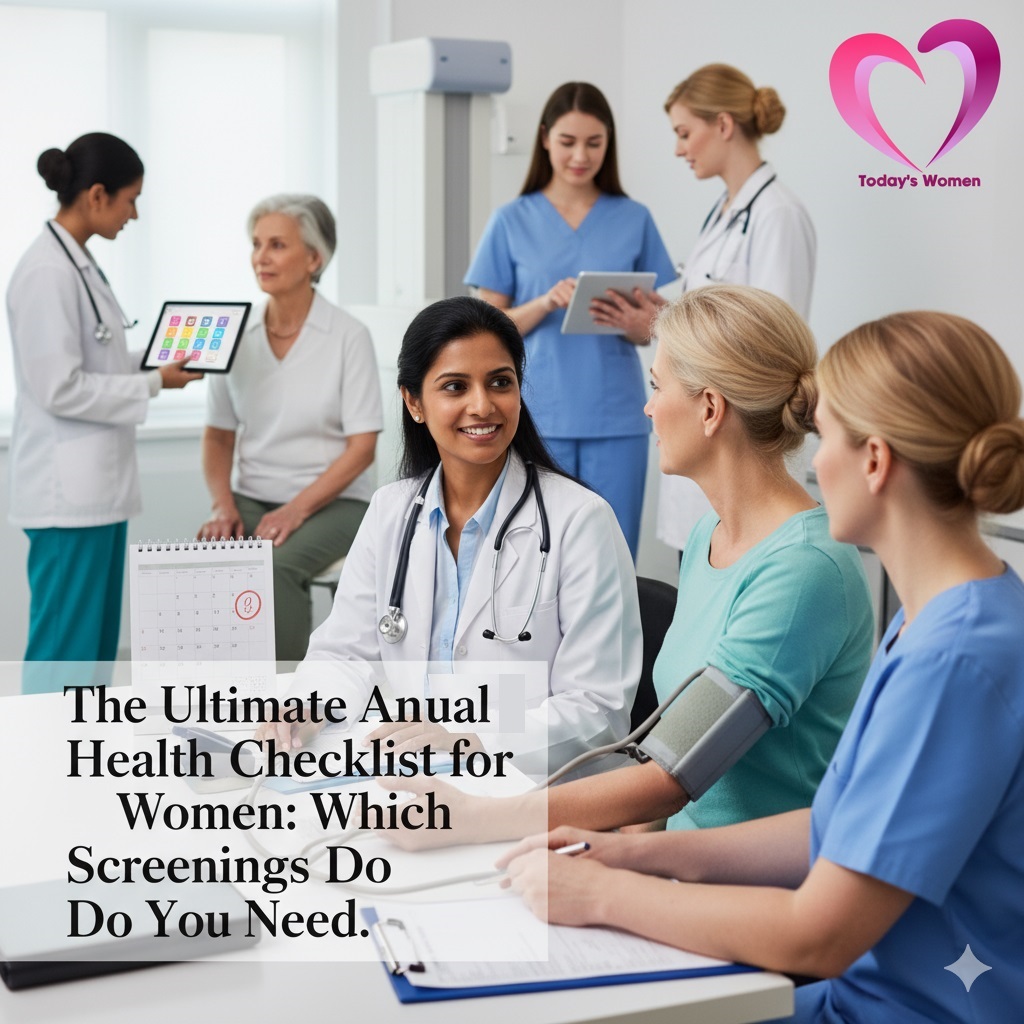The Ultimate Annual Health Checklist for women
Which Screenings Do You Need?
Making Proactive Health Your Priority
Taking control of your health means knowing what to check and when. For women, the healthcare journey involves a unique set of preventative screenings that change with age and lifestyle. Your yearly visit to a general practitioner or specialist is the foundation of any effective Annual Health Checklist for women. It’s your opportunity to catch potential problems in their earliest, most treatable stages.
This guide, rooted in up-to-date medical recommendations, details the essential screenings that should be on your personalized Annual Health Checklist for women.
General Wellness: Your Baseline Annual Health Checklist for women
While many screenings are gender-specific, the core of preventative care applies to everyone. These vital checks assess your overall physical well-being.
Core Screenings for Every Woman (Starting Age 18+)
-
Blood Pressure Check: Hypertension (high blood pressure) is often called a “silent killer.” This check should happen at every single appointment.
-
Blood Work (Lipid Panel & Glucose): A cholesterol test screens for high LDL (bad) cholesterol, and a glucose test screens for pre-diabetes and Type 2 diabetes. The frequency depends on your baseline results, but they are often done during your routine Annual Health Checklist for women.
-
Body Mass Index (BMI) & Lifestyle Review: Your doctor will assess your weight and review your diet, physical activity, and sleep patterns. For a comprehensive overview, consider consulting one of the trusted
Best Private GPs in London -
Dental & Oral Health: While often overlooked, regular dental check-ups and orthodontist visits are critical parts of overall health. Issues like periodontitis can affect heart health. Ensure your Annual Health Checklist for women includes a check with your dentist, and if needed, review specialists like the
Best Orthodontists in London

The Gynaecological Core of the Annual Health Checklist for women
For women, certain screenings are essential for reproductive and hormonal health, and they form the most crucial part of the Annual Health Checklist for women.
Cervical Cancer Screening (Pap Smear and HPV Test)
-
Who Needs It: Women aged 25 to 64 (in the UK).
-
Frequency: Typically every three to five years, based on age and previous results.
-
Purpose: The Pap smear looks for abnormal cells, while the HPV test checks for the presence of the Human Papillomavirus, which causes almost all cases of cervical cancer. If you have an abnormal result, further investigation, such as a Colposcopy, may be required. You can find detailed
health information on cervical health
Breast Cancer Screening (Mammography)
-
Who Needs It: Women aged 50 to 71 (in the UK).
-
Frequency: Every three years.
-
Purpose: Mammography is an X-ray of the breast used to look for signs of breast cancer. For women with a strong family history, screening may start earlier.
Ovarian and Uterine Health
While there are no routine screenings for the general population for ovarian cancer, your primary care physician or private gynaecologist in London should discuss any symptoms like bloating, pelvic pain, or changes in bowel habits during your yearly check-up.
The expertise of a dedicated specialist is invaluable when developing your individual Annual Health Checklist for women. You can search for the
Age-Based Screenings and the Mental Health Component
As you age, new screenings become necessary. Moreover, no Annual Health Checklist for women is complete without assessing mental well-being.
Bone Health (Osteoporosis Screening)
-
Who Needs It: Women aged 65 and older, or younger women with significant risk factors (e.g., history of fractures, low body weight, certain medications).
-
Test: A DEXA scan (Dual-Energy X-ray Absorptiometry) measures bone mineral density. Bone density typically decreases after menopause, making this screening a vital component of the later-life Annual Health Checklist for women.
Mental Health Assessment
Depression and anxiety often go undiagnosed. Your private gynaecologist in London or GP should regularly check for symptoms of mental health issues, especially during major life transitions like pregnancy, postpartum, or menopause. Open discussion with your doctor about mood, stress, and sleep is crucial for ensuring that every aspect of the Annual Health Checklist for women is addressed.
Your health is dynamic. Regularly updating your Annual Health Checklist for women based on the latest medical guidelines and your personal history empowers you to live a healthier, longer life. Be proactive, be informed, and always discuss your screening schedule with a trusted healthcare professional.
For specialized and timely care, you may wish to see a
Frequently Asked Questions (FAQs)
Understanding your Annual Health Checklist for women involves knowing the details of each test.
10-12 Essential Questions on Your Annual Health Checklist for women
-
What is included in the basic Annual Health Checklist for women? The basic checklist includes blood pressure, weight, BMI, a comprehensive physical exam, and blood tests for cholesterol and glucose.
-
When should I start getting mammograms? In the UK, the NHS screens women between 50 and 71 every three years. If you have a family history of breast cancer, discuss starting earlier with your GP.
-
How often do I need a Pap smear? Guidelines in the UK recommend cervical screening for women aged 25 to 64, typically every three to five years, provided previous results were normal.
-
Is the HPV test the same as a Pap smear? No, but they are often done together. The Pap smear looks for abnormal cells, while the HPV test looks for the high-risk types of the virus that cause the cellular changes.
-
What does a DEXA scan check for? A DEXA scan measures bone mineral density and is the primary tool for diagnosing osteoporosis.
-
At what age is a Bone Density scan usually recommended? It’s generally recommended starting around age 65 for women, but earlier if you have specific risk factors like a low BMI or a history of significant fractures.
-
Should I see a general practitioner (GP) or a gynaecologist for my checklist? A GP can manage the general health aspects (blood pressure, cholesterol, diabetes). A gynaecologist specializes in reproductive health (Pap smears, pelvic exams). Ideally, you should maintain appointments with both.
-
What is a Colposcopy and when is it needed? A Colposcopy is a procedure to examine the cervix closely using a magnifying instrument. It’s usually performed if a Pap smear result shows significant abnormal cells.
-
Are mental health screenings part of the checklist? Yes. Your doctor should ask questions about your mood, stress levels, and sleep quality to screen for common issues like depression and anxiety.
-
What are the risk factors that require me to start screenings earlier? Family history of cancer (breast, ovarian, colorectal), smoking, obesity, and previously diagnosed chronic conditions often necessitate an earlier or more frequent screening schedule.
-
Do I need to fast before my annual health checkup? If your doctor is performing a full lipid panel (cholesterol and triglycerides), you will likely need to fast for 9–12 hours beforehand. Always confirm this with your clinic when booking.
-
Are these preventative services covered by health insurance? In the UK, many of these screenings are provided free of charge through the NHS. Private health insurance often covers preventative check-ups, but it is always best to check your specific policy details.
